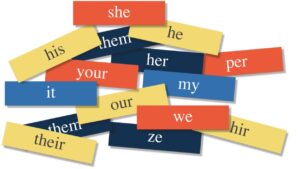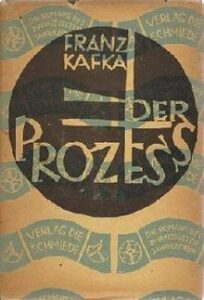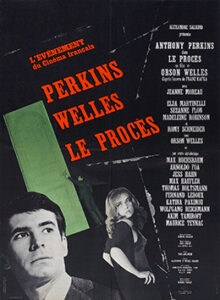The Political Force of Pronouns

I was going to write an essay today about identity politics and gender ideology. It’s a big, interesting subject, with plenty to argue about. But one aspect of it has become a wedge issue politically. I’m talking about the crusade to mandate (either by social force or by legal force) “gender preferred” pronouns.
In case you aren’t familiar with the debate, it has several iterations. Three of the most common are:
* Gender is a social construct. Masculine and feminine are adjectives that describe personal traits that society has invented. They purport to describe the differing tendencies and characteristics of males and females. But in reality, they are traits that either sex can have and exhibit.
* Sex, too, is a social construct. Unlike other mammals, the sex of Homo sapiens is not determined by DNA or the biological results of DNA, such as genitalia. One’s sex is determined by the sex one “identifies as” at any point in time.
* Because both gender and sex are social constructs, gender and sex don’t exist. To put it differently, gender and sex exist only as notions of identity on an ever-changing ideational spectrum that cannot be, and should not be, defined by either law or custom. Doing so, even accidentally, is a form of violence, and should be prohibited by force.
As I’ve mentioned before, I am well aware that there are people that feel like they were born in, or are otherwise living in, a physical body that does not comport to the sex they identify with. Furthermore, I believe that adults who feel that way have a right to change their physical appearance and emotional tendencies by taking hormones and having surgery – measures that require a great deal of bravery. My guess is that having “gender affirming care,” as they call it, is unlikely to improve their mental health. Still, they have every right to give it a go. And when an individual has completed this transformation, I believe it would be mean spirited, when in the presence of such a fully transitioned individual, to refuse to use the pronoun that comports with their renovated (however artificially) body. I don’t think it should be outlawed, but I don’t see why any considerate person should do otherwise.
That said, I do have a problem when the “preferred” pronoun debate gets bizarre and irrational. For example:
* When people who have not transitioned insist on being called what they do not in any way look like.
* Or when, as is the case with Canada, the state mandates that citizens use preferred pronouns under penalty of law.
The problem with these two stances is obvious. It is only by the threat of social or legal punishment that a society can force individuals to say they believe something is true that is obviously false. A big, hairy man with a penis wearing a skirt and lipstick is not a woman. No matter how he dresses or what sort of cosmetic he puts on his face.
What we could call such a person… what we should call such a person is “a man that identifies as a woman.”
That’s it. Nothing more. If he hasn’t done the transition, he is not, by any stretch of logic, a woman. Why, except for mental illness, should he claim to be?
And by the way, what’s wrong with being called “a man that identifies as a woman” when that is what one is? Don’t be embarrassed. Own it. Say it. Be proud of it!
Likewise, how can anyone that is rational agree to call such a man a woman? One can argue that using a non-transitioned person’s preferred pronouns is “a courtesy” and “no big thing.” But it is a big thing. It’s scientifically and provably false.
To say that to take part in a very dangerous social deceit that cannot be described as anything other than a new religion.
I was going to write more on the preferred pronoun issue, but I’m running out of time. So I’ll just outline my arguments by saying this:
* If you can redefine a word, you can redefine a thought.
* If you can banish a word, you can silence a thought.
* If you can silence a thought, you can silence an idea.
* If you can silence an idea, you can banish an ideology.
* If you can banish an ideology, you can banish rational thinking.
* If you can banish rational thinking, you can create new laws.
* If you can create new laws, you can vanquish your opponents.
* If you can vanquish your opponents and banish rational thinking, you can have a contented, tyrannical state.
* Mandated language is the single most important step on the road to tyranny.
And here are some thoughts on the subject that I’ve gathered from others:
* Pronouns are the gateway drug to a larger ideology. Our kindness and politeness is weaponized.
* Pronouns are a wedge of speech control under the disguise of politeness. It’s a huge, narcissistic burden upon other people.
* When asked for my pronouns, I say “I have no special requests.” And if they push, I tell them “I have no desire to dictate your speech. Use whatever pronouns you want for me, and if they aren’t correct I promise I will not crumble.”
* Pronouns are words that other people use to describe you. To dictate pronouns is to dictate another person’s speech.
* No one ever addresses why a person with gender confusion’s right to coerce speech from other people trumps my right to live in reality. I find it traumatic to be forced into saying things I know are not true. This is significant stress. So why is it not considered cruel and unfair to FORCE me to go along with the pronoun game?
* What I do is first say, “Are you sure it’s okay. I mean, I don’t want to impose.” Given encouragement, I say, “Thank you for the freedom to finally express my inner self. My pronoun is “His Sublime Majesty.”
 MarkFord
MarkFord











